Fiction
Fiction

Blackouts
Out in the desert in a place called the Palace, a young man tends to a dying soul, someone he once knew briefly, but who has haunted the edges of his life. Juan Gay—playful raconteur, child lost and found and lost, guardian of the institutionalized—has a project to pass along to this new narrator. It is inspired by a true artifact of a book, Sex Variants: A Study in Homosexual Patterns, which contains stories collected in the early twentieth century from queer subjects by a queer researcher, Jan Gay, whose groundbreaking work was then co-opted by a committee, her name buried. As Juan waits for his end, he and the narrator trade stories—moments of joy and oblivion—and resurrect lost loves, lives, mothers, fathers, minor heroes. The past is with us, beside us, ahead of us; what are we to create from its gaps and erasures?
Inspired by Kiss of the Spider Woman, Pedro Páramo, Voodoo Macbeth, the book at its own center and the woman who created it, oral histories, and many more texts, images, and influences, Justin Torres's Blackouts is a work of fiction that sees through the inventions of history and narrative. An extraordinary work of creative imagination, it insists that we look long and steady at the world we have inherited and the world we have made—a world full of ghostly shadows and flashing moments of truth.
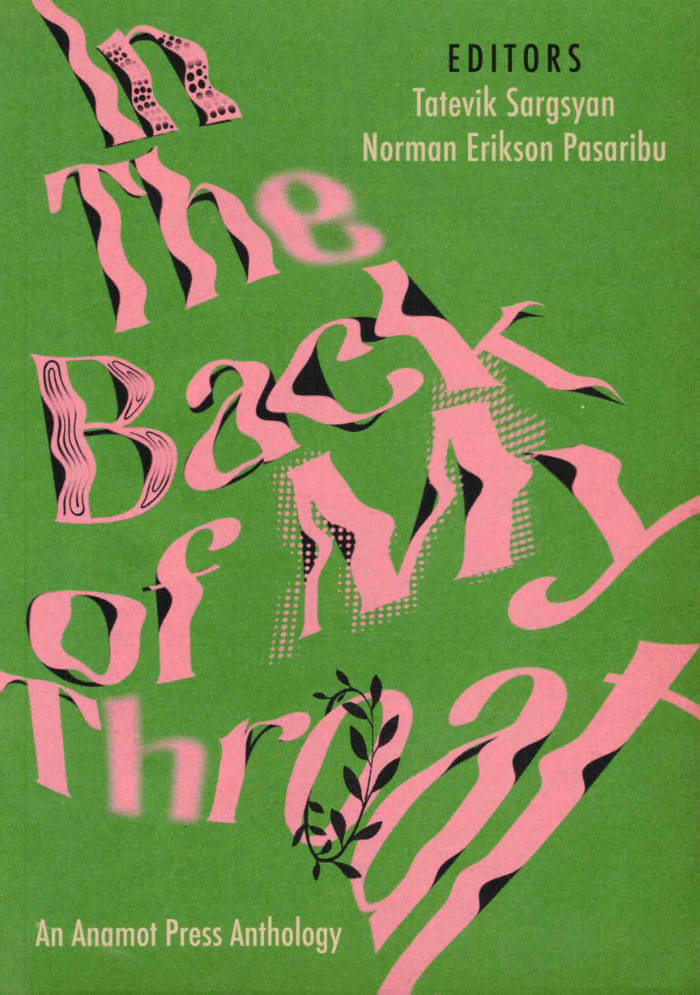
In The Back of My Throat
Norman Erikson Pasaribu, Tatevik Sargsyan
In The Back of My Throat is an anthology about queer Indonesian experiences across borders and other stories told with no shame.
Edited by Tatevik Sargsyan and Norman Erikson Pasaribu.
With contributions from: Zar Mose, Khairani Barokka, JR Hadi, Kristal Firdaus, Anna Sulan Masing, Pear Nuallak, Ko Ko Thett, Kyi May Kaung, Ziggy Zezsyazeoviennazabrizkie, Pychita Julinanda, Prahara Amelia, Madina Malahayati Chumaera, Nurdiyansyah, Mak Lin, Caesar Abrisam.
The title is taken from Prahara Amelia’s poem.
Norman Erikson Pasaribu is a Bali-based writer, translator, and editor. Their poetry collection My Dream Job will be out in the UK in 2024 with Tilted Axis Press.
Tatevik Sargsyan is founding publisher and editor of Anamot Press, Trustee of the Poetry Translation Centre and a design strategist working with charities and philanthropy.

A Garden Manifesto
What do gardens mean and how can they change the world? A Garden Manifesto gathers radical visions rooted in the earth from artists, writers, gardeners and activists, among them Lubaina Himid, Derek Jarman, Jamaica Kincaid, Ana Mendieta, Dan Pearson and Wolfgang Tillmans. It’s a seed box for an uncertain future, packed with anarchic dreams of Eden-making and humming with resistance to the colonial project of homogenisation and destruction.
Featuring William Blake, Joe Brainard, Jonny Bruce, John Clare, Gerry Dalton, Ellen Dillon, Baha Ebdeir, Alys Fowler, Magdalena Suarez Frimkess, Gaylene Gould, Green Guerillas, Joy Gregory, Fritz Haeg, Lubaina Himid, Philip Hoare, Rosie Hudson, Derek Jarman, Chantal Joffe, Laura Joy, Jamaica Kincaid, Elisabeth Kley, Olivia Laing, Jeremy Lee, Siobhan Liddell, Alison Lloyd, Hilary Lloyd, Jo McKerr, Lee Mary Manning, Ana Mendieta, Bernadette Mayer, Rosemary Mayer, Huw Morgan, Eileen Myles, Hussein Omar, Palestinian Heirloom Seed Library, Ian Patterson, Dan Pearson, Jean Perréal, Charlie Porter, Pat Porter, J. H. Prynne, Claire Ratinon, Jamie Reid, Lisa Robertson, Kuba Ryniewicz, Saadi, Sui Searle, Sei Shōnagon, Colin Stewart, Tabboo!, Edward Thomasson, Wolfgang Tillmans, Scott Treleaven, John Wieners, David Wojnarowicz, Matt Wolf and Sarah Wood

The Cheap-Eaters
Thomas Bernhard, Douglas Robertson
The cheap-eaters have been eating at the Vienna Public Kitchen for years, from Monday to Friday, and true to their name, always the cheapest meals. They become the focus of Koller’s scientific attention when he deviates one day from his usual path through the park, leading him to come upon the cheap-eaters and to realize that they must be the focal piece of his years-long, unwritten study of physiognomy. The narrator, a former school friend of Koller’s, tells of his relationship with Koller in a single unbroken paragraph that is both dizzying and absorbing. In Koller, the narrator observes a “gradually ever-growing and utterly exclusive interest in thought . . . . We can get close to such a person, but if we come into contact with him we will be repelled.” Written in Bernhard’s hyperbolic, darkly comic style, The Cheap-Eaters is a study of the limits of language and thought.
Thomas Bernhard was one of the most important and unique writers of the twentieth century. Born in 1931, Bernhard published numerous novels and autobiographical writings, as well as short stories, plays, and poetry, including The Loser and Extinction. Many of his prose works feature complex narrative structures and obsessive, misanthropic monologues. After years of chronic lung illness, Bernhard died in Austria in 1989.
Douglas Robertson is a translator based in Baltimore, Maryland. He studied British and American Literature at the New College of Florida and Johns Hopkins University. He has translated works from German into English by authors including E. T. A. Hoffmann, Hugo von Hofmannsthal, Christian Morgenstern, Novalis, and Ludwig Tieck, and he has studied Thomas Bernhard’s work for over ten years. The Cheap-Eaters is his first book-length published translation.

The TV Sutras
Inspired by visionaries like Moses, William Blake, and Joseph Smith, Bellamy spent five months in 2009 receiving transmissions from her television set and writing brief commentaries on each. The sutras and commentaries in the present volume are the beginning of an intensive investigation into the nature of religious experience. What are cults? Are they limited to wacko marginal communities, or do we enter one every time we go to work or step into a polling place? What is charisma and why are we addicted to it? Bellamy speaks candidly and intimately to her own experience as a woman, a writer, and former cult member. This commingling of memoir, fiction, collage and essay makes room for horny gurus, visitors from outer space, the tenderness of group life, and maybe the beginnings of a hard-won individualism.
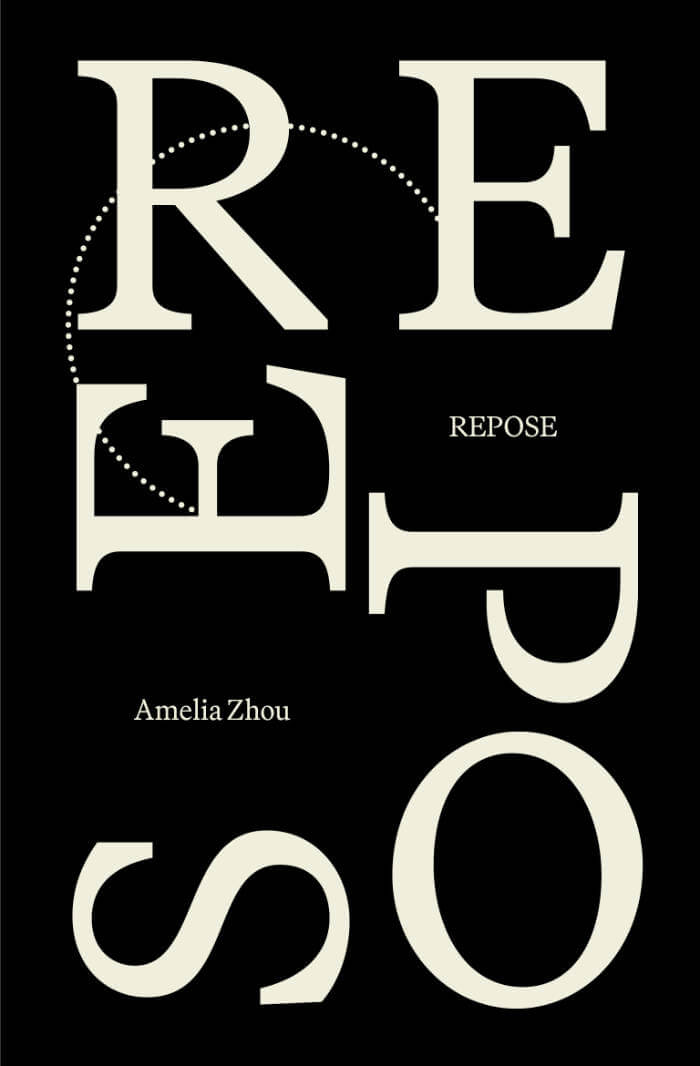
Repose
In her debut book, Amelia Zhou poses the question, “How do I perform or not perform?” Weaving together poems, fiction, and lyric essay, Repose follows an unnamed woman grappling with the limits of the self on the everyday stage of labor and routine, charting her emergent modes of resistance. She is already steps ahead, deftly shifting between worker and dancer, roving through the haunted space in which a performance has just ended, the ruins of a house, or a skyscraper aflame. Seeking the edges of form—where it exceeds itself, where it breaks down—Repose offers a narrative of girlhood invigorated by the mutual possibilities of dreaming and defiance.
Amelia Zhou's Repose is the 2022 Open Reading Period Book Prize winner, and was selected by guest judge Asiya Wadud.
About the author
Amelia Zhou was born and raised in Sydney, Australia, and currently lives in Cambridge, England. Her work as a writer is often interdisciplinary and hybrid in form and media, and has appeared most recently in Fence, Liminal, and Orleans House Gallery. She is pursuing a PhD in English at the University of Cambridge, where she is researching the role and politics of photography in largely anglophone life narratives from the 1970s to the present. She is also currently one of Sydney Review of Books' 2024–25 Emerging Critics Fellows. Repose is her first book.
Praise
Real estate agent, surgical patient, ballet dancer, baby raiser... In Amelia Zhou’s layered, lucid, and dream-suffused Repose, performing professionals remind us that the girl’s vocation remains the management of (her) appearances. As “second bodies,” these figures hover and break apart, like a “mouth now wandering away.” Following the paths of their roving weirdness, Zhou’s poetics alert us to some other more sublime task. “To bloom out the ragged bud.” To notice the “furious dignity” in all her/our many scraps and shreds. —Lauren Bakst
Amelia Zhou’s Repose is a work of measured reflection: it is also a work that is as full of movement and intelligence as the two mediums that Zhou invokes throughout the book, cinema and dance. —Aurelia Guo
Early on in Amelia Zhou’s Repose, the speaker asks the reader, “Do all lost things live in ruins?” Ruins—as in aftermath, as in refuse, as in the rotting and wilted physical landscape—permeate this deft and roving collection of poems. Zhou’s work rests in the fleeting space of bodies in motion, the friction of bodies troubling and inhabiting spaces across planes and distances. Zhou does not attempt to still this movement. Instead, she allows it to fold and create its own repetitions, logic, and accord. Along the way, Zhou opens up a space for the spectral. —Asiya Wadud

My Death
A widowed writer begins to work on a biography of a novelist and artist—and soon uncovers bizarre parallels between her life and her subject’s—in this chilling and singularly strange novella by a contemporary master of horror and fantasy.
The narrator of Lisa Tuttle’s uncanny novella is a recent widow, a writer adrift. Not only has she lost her husband, but her muse seems to have deserted her altogether. Her agent summons her to Edinburgh to discuss her next book. What will she tell him? At once the answer comes to she will write the biography of Helen Ralston, best known, if at all, as the subject of W.E. Logan’s much-reproduced painting Circe , and the inspiration for his classic children’s book.
But Ralston was a novelist and artist in her own right, though her writing is no longer in print and her most storied painting too shocking, too powerful—malevolent even—to be shown in public. Over the months that follow, Ralston proves a reluctantly cooperative subject, even as her biographer uncovers eerie resonances between the older woman’s life and her own. Whose biography is she writing, really?

Crazy for Vincent
Diary, memoir, poem, fiction? Autopsy, crime scene, hagiography, hymn? The chronicle of an obsessive love. In the middle of the night between the 25th and 26th of November, Vincent fell from the third floor playing parachute with a bathrobe. He drank a liter of tequila, smoked Congolese grass, snorted cocaine...
Crazy for Vincent begins with the death of the figure it fixates upon: Vincent, a skateboarding, drug-addled, delicate "monster" of a boy in whom the narrator finds a most sublime beauty. By turns tender and violent, Vincent drops in and out of French writer and photographer Hervé Guibert's life over the span of six years (from 1982, when he first met Vincent as a fifteen-year-old teenager, to 1988). After Vincent's senseless death, the narrator embarks on a reconnaissance writing mission to retrieve the Vincent that had entered, elevated, and emotionally eviscerated his life, working chronologically backward from the death that opens the text. Assembling Vincent's fragmentary appearances in his journal, the author seeks to understand what Vincent's presence in his life had been: a passion? a love? an erotic obsession? or an authorial invention? A parallel inquiry could be made into the book that results: Is it diary, memoir, poem, fiction? Autopsy, crime scene, hagiography, hymn? Crazy for Vincent is a text the very nature of which is as untethered as desire itself.
Hervé Guibert (1955-1991) was a writer, a photography critic for Le Monde, a photographer, and a filmmaker. In 1984 he and Patrice Chereau were awarded a César for best screenplay for L'Homme Blessé. Shortly before his death from AIDS, he completed La Pudeur ou L'impudeur, a video work that chronicles the last days of his life.

The Seers
The Seers follows the first weeks of a homeless Eritrean refugee in London. Set around a foster home in Kilburn and in the squares of Bloomsbury, where its protagonist Hannah sleeps, the novel grapples with how agency is given to the sexual lives of refugees, insisting that the erotic and intimate side of life is as much a part of someone’s story as ‘land and nations’ are.
Hannah arrives in London with her mother’s diary, containing a disturbing sexual story taking place in Keren, Eritrea, where the Allies defeated the Italians in the Second World War. In a gripping, continuous paragraph, The Seers moves between the present day and the past to explore intergenerational histories and colonial trauma alongside the psychological and erotic lives of its characters as their identities are shaped, but refused to be suppressed, by the bureaucratic processes of the UK asylum system.
Sulaiman Addonia is an Eritrean-Ethiopian-British novelist. He spent his early life in a refugee camp in Sudan, and his early teens in Jeddah, Saudi Arabia. He arrived in London as an underage unaccompanied refugee without a word of English and went on to earn an MA in Development Studies from SOAS and a BSc in Economics from UCL. His first novel, The Consequences of Love (Chatto & Windus, 2008), was shortlisted for the Commonwealth Writers’ Prize and was translated into more than 20 languages. His second novel, Silence is My Mother Tongue (Indigo Press, 2019; Graywolf, 2020), was a Finalist for the Lambda Literary Awards 2021, the Firecracker (CLMP) Awards, the inaugural African Literary Award from The Museum of the African Diaspora (MoAD) in San Francisco, and longlisted for the 2019 Orwell Prize for Fiction. Addonia’s essays appear in LitHub, Granta, Freeman’s, The New York Times, De Standaard and Passa Porta. He is a contributor to Tales of Two Planets (Penguin, 2020) and Addis Ababa Noir (Akashic Books, 2020).
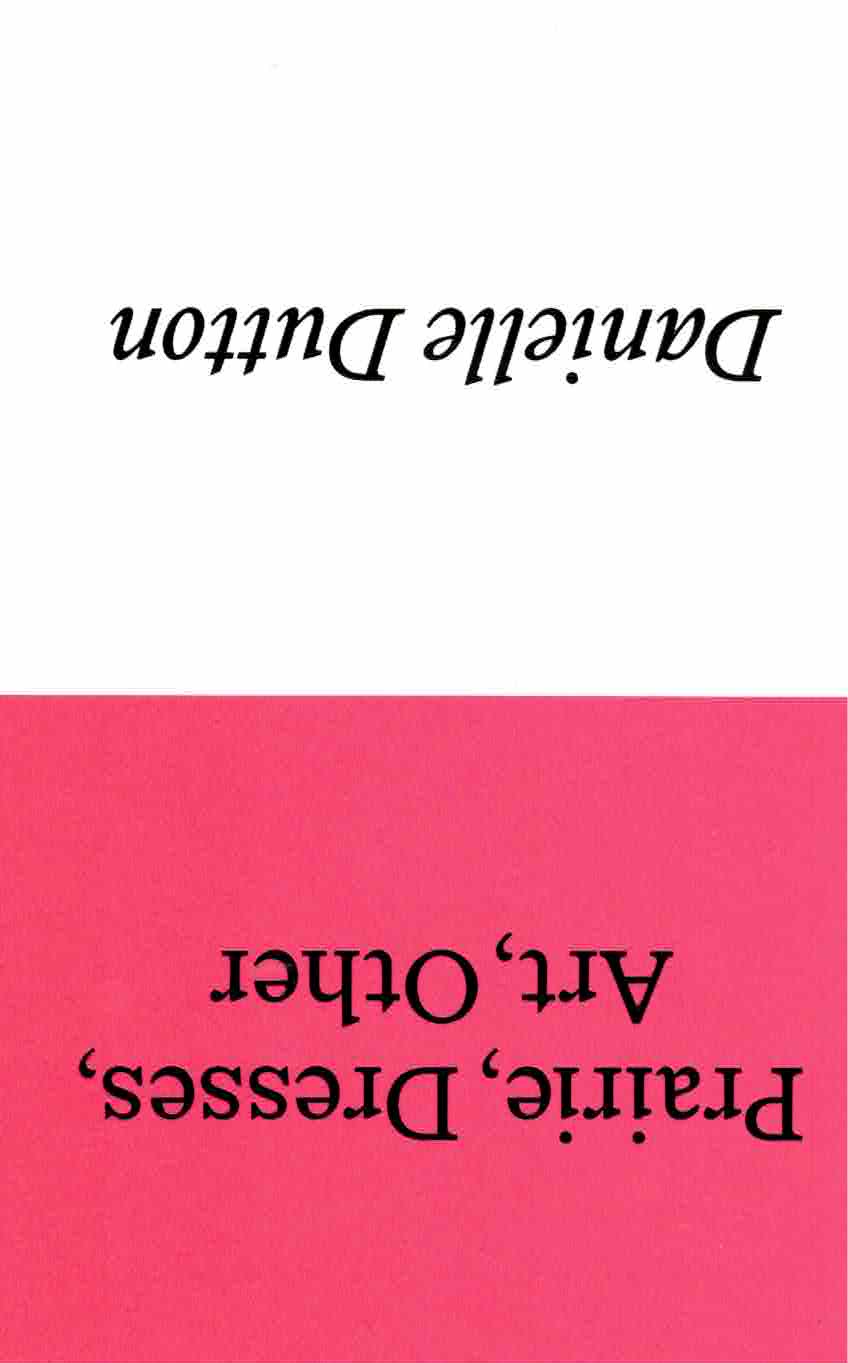
Prairie, Dresses, Art, Other
In Prairie, Dresses, Art, Other Danielle Dutton imagines new models for how literature might work in our fractured times. Dutton’s writing is as protean as it is beguiling, using the different styles and different spaces of experience to create a collage of the depths and strangeness of contemporary life.
This hybrid literary collection covers an inventive selection of subjects in four eponymous sections which contrast and echo one another, challenging our expectations and pushing the limits of the dream-like worlds and moods that language might create.
‘Danielle Dutton is a writer whose work I wait for. When a new book comes, I keep it very close… Her growing body of work is among the most formally inventive (and therefore essential) I can think of, and Prairie, Dresses, Art, Other is a vital, enlivening addition to it.’ – Kate Briggs
Danielle Dutton is the author of the novels Margaret the First and SPRAWL, the prose collection Attempts at a Life, the illustrated nonfiction chapbook A Picture Held Us Captive, and she wrote the text interpolations for Richard Kraft’s Here Comes Kitty: A Comic Opera. Her fiction has appeared in magazines and journals including The New Yorker, The Paris Review, The White Review, Harper’s, BOMB, and NOON. Dutton teaches at Washington University in St. Louis and is cofounder and editor of the award-winning feminist press Dorothy, a publishing project. Born and raised in California, she has lived on the (former) prairie now for roughly twenty years.

I will pay to make it bigger
You wake up in the footwell of a mid-sized hatchback somewhere on a highway in outer Bangkok. You compile neurotic spreadsheets of the best ‘party destinations’ in Europe, whilst your work emails pile up without ever being read. You quit your job. You launch a banal start-up. You grieve for a past relationship. You stare endlessly at the waves coming in from a beach in Koh Pha Ngan. You vape intensely. You spend money on feelings, on the performance of your own persona, whilst you observe yourself with a detached sense of horror.
i will pay to make it bigger is a novella, by poet and artist Ahren Warner, in which ‘you’ are the main character. Through text and image – autofiction, docufiction, and just plain fiction – you work your way through a tangle of preoccupations: from what it means to buy enjoyment, to the fragile construction of your own self as a cultural product.
i will pay to make it bigger is also a photobook, a collection of images produced whilst living in Thai ‘party hostels’. Although these photographs might seem to exist as the documentation of intimate or ecstatic moments, they are in fact quite painstakingly, and artificially, constructed: composited and manipulated from multiple still frames of film footage to produce images that advertise the calculated artifice of their own hedonism, emotion and seemingly raw experience.
With a Coda by Hana K. Ohnewehr, commissioned by Yu’an Huang

My Lesbian Novel
The latest in writer and visual artist Renee Gladman's ever-expanding body of imaginative investigation is a sui generis novel of queerness and art-making, philosophy and sex.
The narrator of My Lesbian Novel is Renee Gladman, an artist and writer who has produced the same acclaimed body of experimental art and prose as real-life Renee Gladman, and who is now being interviewed by an unnamed interlocutor about a project in process, a seeming departure from her other works, a lesbian romance.
Between reflections on art making and on the genre of lesbian romance - "though aspects of the formula drive me crazy... people who write these stories understand how beautiful women are" - a romance novel of her own takes shape on the page, written alongside the interview, which sometimes skips whole years between questions, so that time and aging become part of the process.
The result is a beautifully orchestrated dialogue between reflection and desire, or clarity and confusion, between the pleasures of form and the pleasures of freedom in the unspooling of sentences over time.
Renee Gladman is a writer and artist preoccupied with crossings, thresholds, and geographies as they play out at the intersections of poetry, prose, drawing, and architecture. She is the author of fourteen published works, including a cycle of novels about the city-state Ravicka and its inhabitants, the Ravickians, all published by Dorothy— Event Factory, The Ravickians, Ana Patova Crosses a Bridge, and Houses of Ravicka. She has been awarded fellowships, artist grants, and residencies from the Radcliffe Institute for Advanced Study at Harvard, Foundation for Contemporary Arts, the Lannan Foundation, and KW Institute for Contemporary Art (Berlin), and was a 2021 Windham-Campbell Prize winner in fiction. She makes her home in New England with poet-ceremonialist Danielle Vogel.
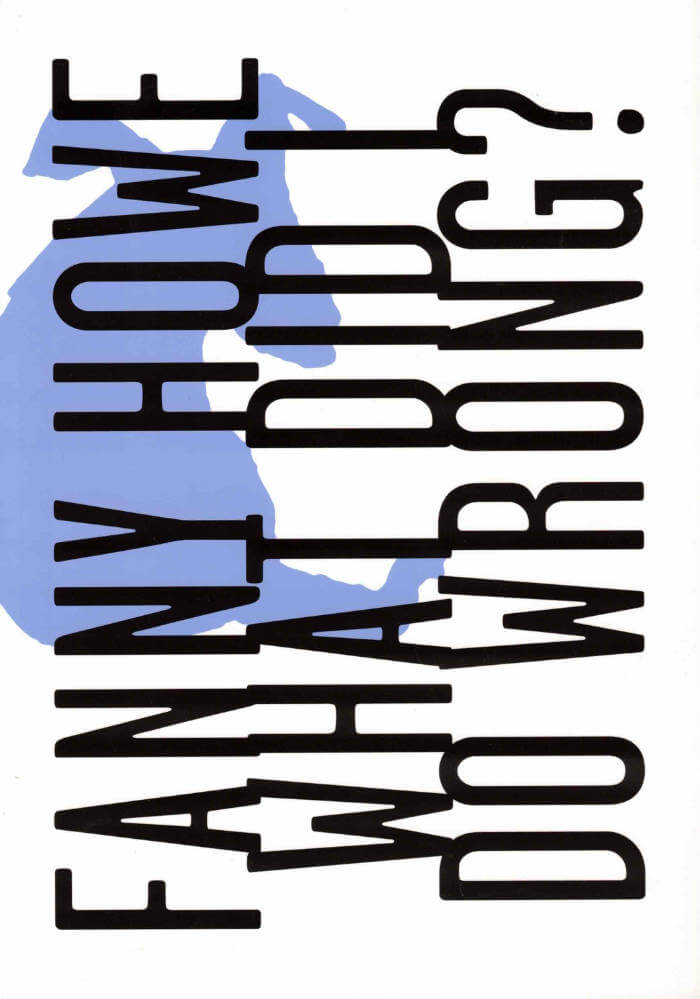
What Did I Do Wrong?
Episodic and picaresque, Fanny Howe's novella What Did I Do Wrong? tells the story of a revolutionary mutt's journey through the kennels, parks, and suburban waste spaces around Boston in search of true freedom. This dog offers a firsthand account of the cruelty meted out to both animals and forgotten members of human society. Like The Golden Ass, What Did I Do Wrong? takes on moral and spiritual questions without abandoning earthly appetites. In a twist on the fabulous tradition established by Apuleius, we are urged not to maintain our humanity but rather to look for the dog within.
Illustrated by Colleen McCallion.
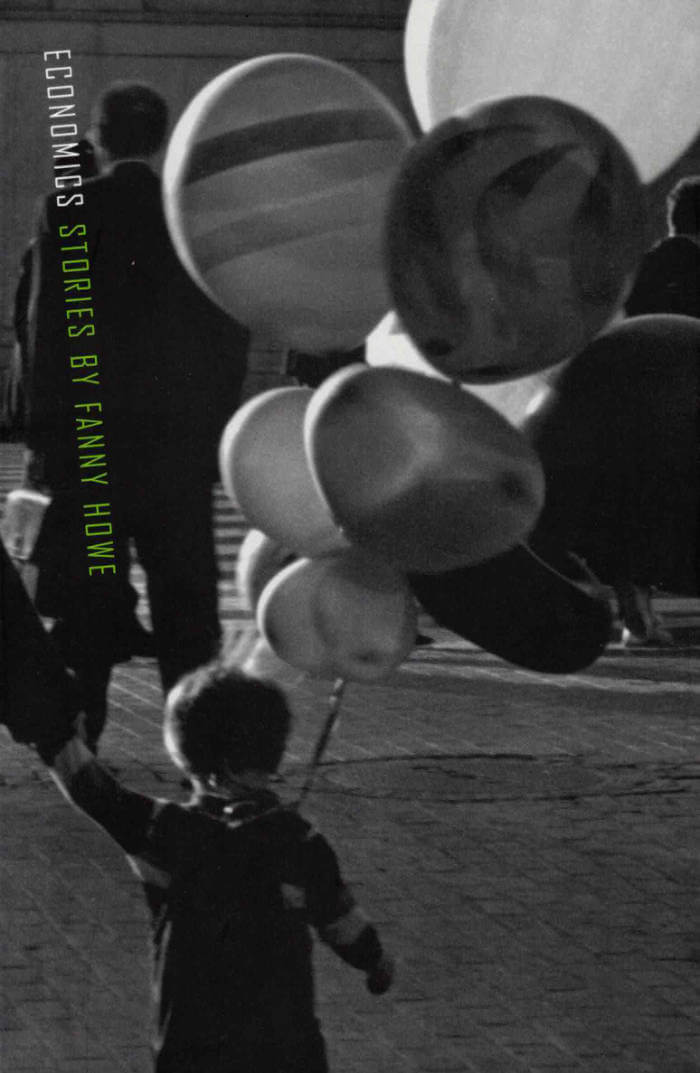
Economics
Largely set in Boston, Fanny Howe's Economics examines with an unwavering eye the necessary errors of the 1960s liberalism and consequences of cold war politics. A white liberal couple adopts a black child with troubling results; two old friends from the Kennedy campaign meet years later to discover how different their lives have become; a separated working-class couple drives to the Cape in order to collect the prize from an instant lotto game. In each story, love is eroded by class expectations and financial pressures, by racial tensions and ideological hypocrisies. As a result Economics offers a raw portrait of the last three decades that is at once comic and devastating.
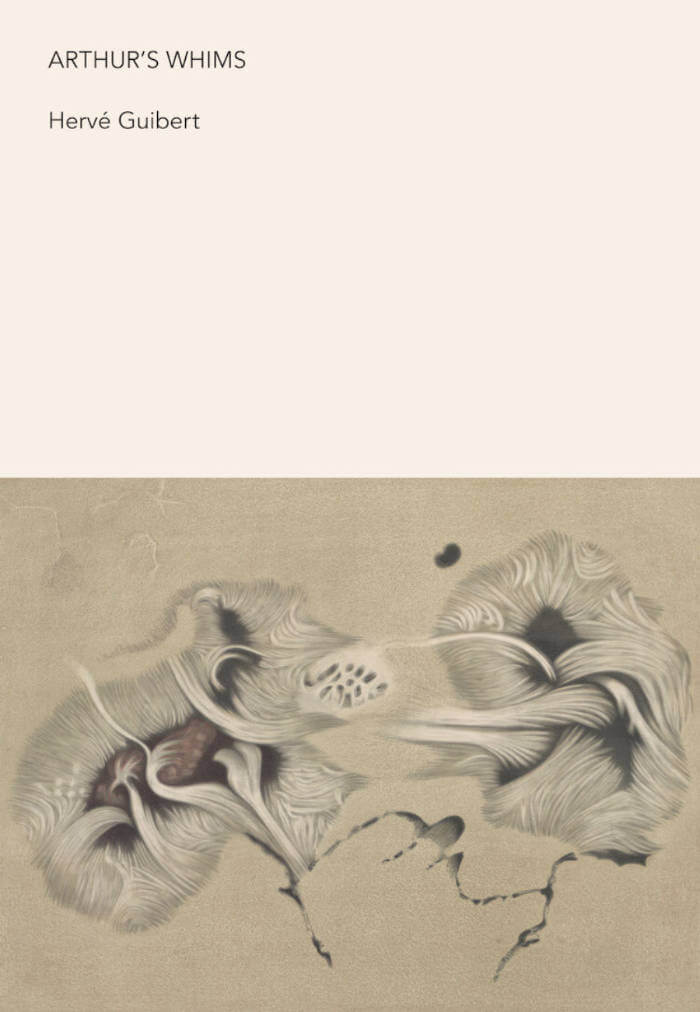
Arthur’s Whims
Arthur’s Whims is the tale of “a modern saint,” a love story born of a childhood dream of being “alone on a boat with a boy, a friend.” Arthur and his beloved Bichon—a young man who, after drinking Arthur’s tears, becomes pregnant with his child—drift through a stream of identities and circumstances: birdcatchers for a French taxidermist; sailors shipwrecked in an ice fortress; explorers of the Isles of Traitors, Babies, and Sadness; famous magicians in Oklahoma; religious and medical marvels. It is an anarchic, outrageous novel, in the tradition of Edgar Allan Poe and Comte de Lautréamont, now available in English for the first time in translation by Dana Lupo. This edition includes Hervé Guibert’s essay “The Bear,” in which he compares his books to rooms in a house, writing: “Arthur’s Whims would be the library of the house, and the bedroom of a child who will never be.” It is “a true adventure novel in the tradition of the genre, or what I believed to be its tradition, with great journeys, disasters, shipwrecks, cataclysms.”
“This short novel, offered here along with an essay by Guibert, reads like a madcap picaresque—one in which bodies can transform, the pace is constantly accelerating, and geography proves to be malleable. A gloriously surreal account of an unexpected voyage.” — Tobias Carroll, Words Without Borders
Hervé Guibert was a French photographer, critic, and author. Born in 1955, he published works of autofiction, novels, short stories, and essays, including many on photography. His writing was often deeply personal, ironic, and centered on illness and the body. Guibert died from complications of AIDS in 1991, at the age of thirty-six.
Dana Lupo is a writer and translator based in New York. Their work has appeared in Entropy, Bone & Ink Press, Arcturus (Chicago Review of Books), Apricity Press, and elsewhere. Arthur’s Whims is their first published translation.

Sitt Marie Rose
Sitt Marie Rose is the story of a woman abducted by militiamen during the civil war in Lebanon. Already a classic of war literature, this extraordinary novel won the France-Pays Arabes award in Paris and has been translated into six languages. Sitt Marie Rose is part of Comparative Literature, World Literature, Women’s Studies and Middle East Studies curricula at more than thirty universities and colleges in the U.S.
Translated by Georgina Kleege.
Etel Adnan was born in Beirut, Lebanon in 1925. She is a celebrated writer, essayist, and playwright, and is the author of more than twenty books in all these disciplines. Her work as a whole is a faithful record of the times and places she has lived in Beirut, Paris, and in the San Francisco Bay Area. At least eighteen works by Adnan have been published in English. They include Sitt Marie Rose (Post-Apollo Press, 1982); The Arab Apocalypse (Post-Apollo Press, 1989); Sea and Fog (Nightboat Books, 2012), winner of the Lambda Literary Award for Lesbian Poetry and the California Book Award for Poetry; Premonition (Kelsey Street Press, 2014); Surge (Nightboat Books, 2018); Time (Nightboat Books, 2019), winner of the Griffin Poetry Prize and the Best Translated Book Award; and Shifting the Silence (Nightboat Books, 2020). In 2021, Litmus Press published a second edition of Journey to Mount Tamalpais (originally published by The Post-Apollo Press), which included nine new ink drawings by Adnan. Her paintings, described by New York Times art critic Roberta Smith as "stubbornly radiant abstractions," have been widely exhibited. Spanning media and genres, Adnan's writings have led to numerous collaborations with artists and musicians, including the French part of CIVIL warS, a multi-language opera by American stage director Robert Wilson, performed in Lyon and Bobigny in 1985. In 2014 she was named Chevalier des Arts et des Lettres, France's highest cultural honor, by the French Government. She died in Paris, in 2021.
Georgina Kleege is an internationally known writer and disability studies scholar. Her collection of personal essays, Sight Unseen (1999) is a classic in the field of disability studies. Kleege’s latest book, More Than Meets the Eye: What Blindness Brings to Art (2018) is concerned with blindness and visual art. Kleege joined the English department at the University of California, Berkeley in 2003 where in addition to teaching creative writing classes she teaches courses on representations of disability in literature, and disability memoir. Kleege is also the author of Home for the Summer (The Post-Apollo Press, 1989).

Fail Worse
It was the year that autofiction was everywhere.
All the major authors were accused of writing autofiction. You, the reader, were reading autofiction, maybe even writing autofiction yourself. The little known author HWK also was working towards his own autofiction, cycling through London, drafting, redrafting, scrapping, and scraping by, spiraling through his own mind, a geography of ambient anxiety, and a rising sea of associations and dead ends. As the tides begin to overwhelm him, HWK finds lifelines in the various stories that float past.
Possible rescuers, including Ben Lerner, Maggie Nelson, Sheila Heti, Mario Levrero, Jay Sherman (best known by his professional title, The Critic), and the noted animated therapist Dr. Katz call out to our narrator from the shores of literary and cultural success, will he reach them before the waters close over his head? Will HWK, dear reader, reach you?
Fail Worse is the smartest novel I’ve read in a long time, at once a scathing and hilarious critique of the limitations and conventions of autofiction as well as a moving work of personal narrative. I want to give copies of this novel to every writer I know. – Madeleine Watts, author of The Inland Sea
A brilliantly audacious and thoroughly ridiculous book – skewers its subject with a grandeur and wit it scarcely deserves… a stained glass window thrown at a pebble. – Keiran Goddard, author of I See Buildings Fall Like Lightning

Vaders van de Brusselse Halsbandparkiet
Joren Peeters, Antonino Triolo
Remember that first time you were startled by a shrill screech, looked up and saw to your amazement a green parakeet perched on a branch in the middle of Brussels? There are some juicy and perhaps even instructive urban legends being told about the origins of the Brussels ring-necked parakeet.
Joren Peeters has collected and dramatized three of these urban legends, Antonino Triolo has illustrated them, and graphic designer Lise Leën has put them together in a kind of bird-watching book revealing the mythical origins of the Brussels ring-necked parakeet: De Vaders van de Brusselse Halsbandparkiet.
In these illustrated stories, the ring-necked parakeet appears to be a symbol of male hubris: the bird is born from the typically male, naive, unworldly and arrogant desire to impose a vision of Good on the world. The three fathers turn out to be three parodies of the hero, three tragic do-gooders.
(NL)
Weet je nog die eerste keer dat je opschrok door een schril gekrijs, opkeek en tot je verbazing een groene parkiet op een tak zag zitten – in het midden van Brussel? Er doen over de oorsprong van de Brusselse halsbandparkiet enkele sappige en misschien zelfs leerrijke urban legends de ronde.
Joren Peeters heeft er drie verzameld, uitvergroot en uitgeschreven, Antonino Triolo heeft ze geïllustreerd en Lise Leën heeft ze samengezet in een soort vogelspotboekje: “De Vaders van de Brusselse Halsbandparkiet”.
In deze geïllustreerde verhalen blijkt de halsbandparkiet een symbool voor mannelijke hoogmoed: ze zijn geboren uit het typisch mannelijke, wereldvreemde en arrogante verlangen om uw visie op het goede aan de wereld op te leggen. De drie vaders blijken drie parodieën op de held, drie fatale wereldverbeteraars.

All Fours
The New York Times–bestselling author of The First Bad Man returns with an irreverently sexy, tender, hilarious, and surprising novel about a woman upending her life
A semifamous artist announces her plan to drive cross-country, from LA to New York. Twenty minutes after leaving her husband and child at home, she spontaneously exits the freeway, beds down in a nondescript motel, and immerses herself in a temporary reinvention that turns out to be the start of an entirely different journey.
Miranda July’s second novel confirms the brilliance of her unique approach to fiction. With July’s wry voice, perfect comic timing, unabashed curiosity about human intimacy, and palpable delight in pushing boundaries, All Fours tells the story of one woman’s quest for a new kind of freedom. Part absurd entertainment, part tender reinvention of the sexual, romantic, and domestic life of a forty-five-year-old female artist, All Fours transcends expectation while excavating our beliefs about life lived as a woman. Once again, July hijacks the familiar and turns it into something new and thrillingly, profoundly alive.

The Last Sane Woman
A beguiling debut novel about friendship and failure, written with unusual craft and spryness by an acclaimed poet
Nicola is a few years out of a fine arts degree, listless and unenthusiastically employed in London. She begins to spend her hours at a university archive dedicated to women's art, because she 'wants to read about women who can't make things'.
There she discovers one side of a correspondence beginning in 1976 and spanning a dozen years, written from one woman – a ceramics graduate, uncannily like Nicola – to her friend, who is living a contrasting and conventionally moored life. As she reads on, an acute sense of affinement turns to obsession, and she abandons one job after another to make time for the archive.
The litany of coincidences in the letters start to chime uncomfortably, and Nicola's feeling of ownership begets a growing what if she doesn't like what the letters lead to?
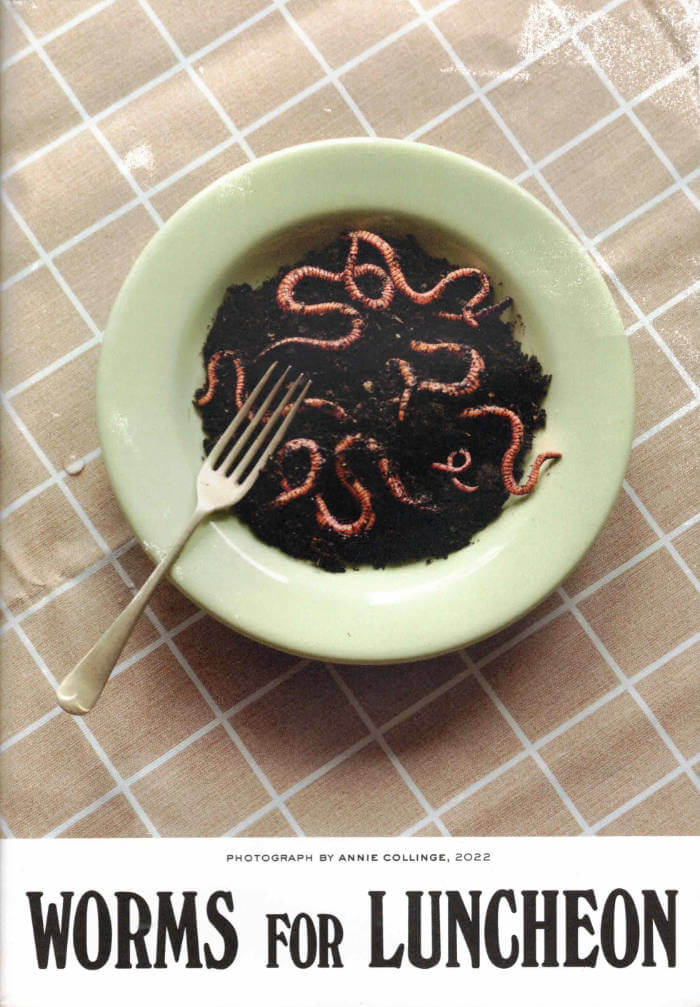
Worms For Luncheon
Worms and Luncheon have come together to bring the tastiest of fertilisers, to accompany your lunch for one. Think of this publication as a wine pairing for bookworms. Each story has been tailored to your taste, with a serving suggestion accompanying each piece. Not to be read in the company of others, and only to be consumed with food.
Featuring contributions from Eileen Myles, Cecilia Pavón, Clem MacLeod, Kate Morgan, Pierce Eldridge, Juliet Jacques, Lynne Tillman, Estelle Hoy, Jodie Hill, Leone Ross, Slutty Cheff, Izdihar Afyouni, Gabriela Aquije and Stephanie LaCava. With photographs by Chieska Fortune Smith.
The 88 page thread bound publication consists of poetry, short stories, personal essays, illustrations and photographs of the cosiest spots to dine alone in.
Concept initiated by Clem MacLeod and France Armstrong Jones
Writing Commissioned by Clem MacLeod
Editors Clem MacLeod, Caitlin McLoughlin, Pierce Eldridge, Arcadia Molinas and Violet Conroy
Cover image by Annie Collinge
Art direction and design by Caitlin McLoughlin and Mariana Sameiro
Illustrations by Clemmie Bache

Feminine Hijinx
Already a member of The Feminist Writers’ Guild and one of the principal founders/proponents of the New Narrative movement, Dodie Bellamy published her first book with Hanuman Books in 1991. Feminine Hijinx brings together two long pieces, "Complicity" and "The Debbies I Have Known", along with a new introduction by the author, written for this reissue.
Dodie Bellamy (b. 1951) is an American writer, journalist, and educator, most often associated with the New Narrative movement. She is the author of The Letters of Mina Harker, Cunt-ups, Pink Steam, The TV Sutras, and co-edited Writers Who Love Too Much: New Narrative Writing 1977–1997 with Kevin Killian.

Bonbons à l'anis
Un fabuleux recueil – le premier publié en français – de poèmes et récits de l'autrice argentine Cecilia Pavón, préfacé par Chris Kraus (écrivaine dont Pavón a par ailleurs traduit des livres en espagnol).
« Cette traduction n'aurait pu voir le jour si je n'avais pas développé pendant quelques temps une obsession quasi malsaine pour l'Argentine. Cherchant à Buenos Aires les traces de lieux proches de Shanaynay que j'avais co-dirigé à Paris, je découvris au hasard sur internet l'existence d'un espace nommé Belleza y Felicidad et dirigé par Fernanda Laguna et Cecilia Pavón. Bien avant l'émergence de l'artist-run space en Europe, les deux femmes créèrent un lieu associant art et littérature. Lors d'un voyage à Buenos Aires, j'eus l'opportunité de rencontrer Cecilia Pavón qui lors d'une conversation sur l'écriture et la poésie, me proposa de traduire Licorice Candies en français. Sa poésie fut autant révélatrice qu'émancipatrice, à la fois par sa singularité et sa simplicité. Elle écrit ce qu'elle voit et ce qu'elle vit. Elle parle de certains quartiers de Buenos Aires, de ses amis, d'elle, d'un vélo qu'elle a perdu, de Timo. Il me semble qu'elle écrit comme elle parle d'amour, d'erreurs et de sexe ». Marion Vasseur Raluy, traductrice
The first collection of texts published in French by the Argentinian artist and poet.
Preface by Chris Kraus.
Translated from the English and Spanish by Marion Vasseur Raluy, Rosanna Puyol Boralevi and Mona Varichon.
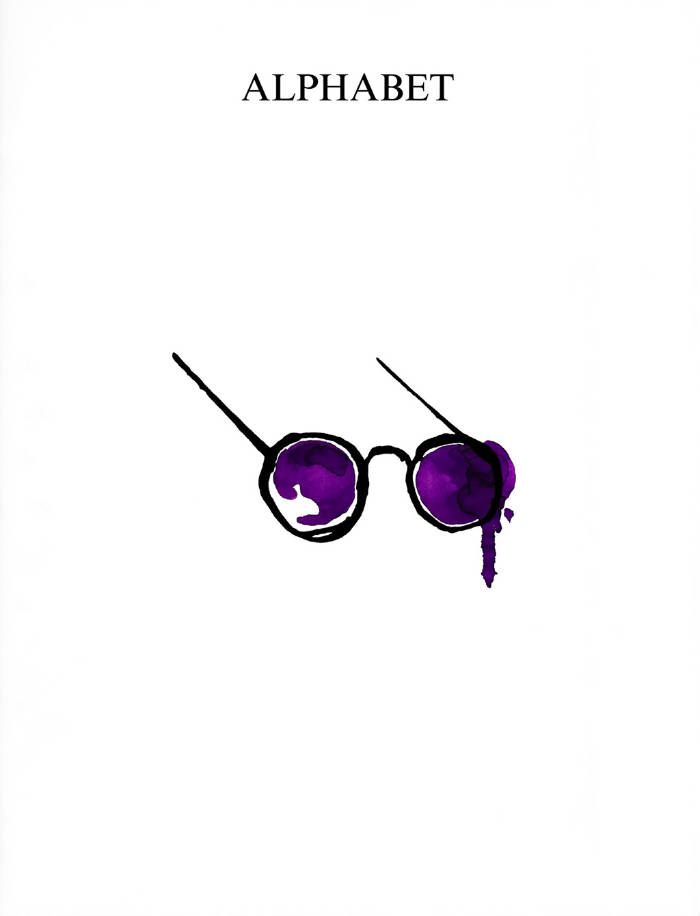
Alphabet Magazine #01
The first issue of the magazine made by artists, founded by Donatien Grau and Thomas Lenthal. Contributions by Mathias Augustyniak, Naomi Campbell, Théo Casciani, Michael Chow, Pan Daijing, Es Devlin, Claire Fontaine, Edwin Frank, Theaster Gates, Nicolas Godin, Alejandro Jodorowsky, Hedi El Kholti, Michèle Lamy, Paul McCarthy, Ian McEwan, Eileen Myles, Marc Newson, Hans Ulrich Obrist, Diana Widmaier Picasso, Ariana Reines, Barbara Chase-Riboud, Julian Schnabel & Jason Momoa, Hanna Schygulla, Juergen Teller, Iké Udé, McKenzie Wark, Robert Wilson, Yohji Yamamoto.
Alphabet is the artists' magazine. Here, they run the show. They write, they make images, they select their own works, they interview the figures they admire, they tell us what we did not know about them nor could have ever fathomed about life. This magazine is conceived entirely to put them in the driver's seat, and to enable readers to become part of the unique vision of some of today's greatest luminaries.
It is a manifestation of the creative community, coming together from all fields, from all generations and threads of culture. Writers, musicians, designers, painters, sculptors, poets—artistic figures of every kind converse all the time in their lives, but they did not have a shared space for their editorial projects. This is it.
Everyone who finds their way into Alphabet has made a mark on life, art, and culture, in a way that signals their importance to the present. Some of the contributors may be world famous, others well respected, others on the way to becoming the legends they already are. Their relevance to culture is the same, and that is why they all belong here, in the endeavor of the creative community. There is no hierarchy of status, or domain, or apparent impact. Some of the greatest revolutions happen undercover. Some of the most established voices are still breaking ground. The magazine's premise is simple: the old opposition between pop and underground does not make sense anymore. There are many creative communities, each following its own rules, each inventing its own space. Here, wherever they come from, whatever their community, artists can exist together, with the same intention of changing, and improving, what life is; with the same belief that art matters more than anything else.
None of the contributors is here randomly. They keep life thrilling and exhilarating, challenge the perception of everything and anything. Their role in shaping every aspect of life can hardly be overstated. That is why they needed a place to elaborate their own alphabet, their way of ordering and structuring language, the world, and the fabric of life—a place of freedom, where everything would be done to highlight their visions, where the very design would be a shrine to their magic. Even the distribution of the magazine was conceived with artists—each contributor suggesting sites of their liking.
Alphabet is also the magazine of magazines. Here, readers find essays, fictions, poetry, visual projects, DIY methods, recommendations from those who know, even games and astrology—and an artist's alphabet, articulating an entire universe. Anything that has ever formed a section of a magazine could find its way here. Even the cover is conceived by an artist: it was conceived especially by the legendary Robert Wilson. Artists will rejuvenate what magazines are, and magazines will be kept forever young by and with them.
Founded by Donatien Grau and Thomas Lenthal, Alphabet is a bi-yearly art magazine. Not a magazine about art. It's a magazine made by artists. Each contribution like an œuvre, making it the ultimate collector piece. Each cover is designed, with the word Alphabet, by a different artist, initiating a cult series.